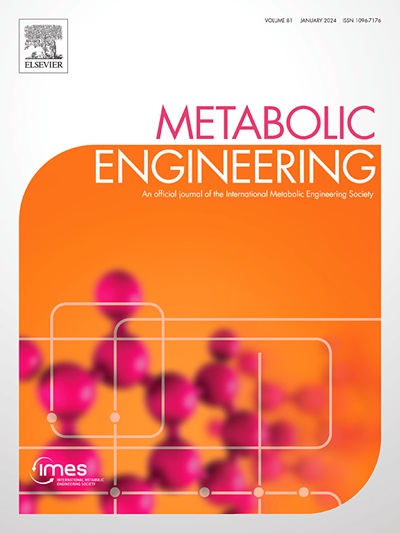Improving the growth and intestinal colonization of Escherichia coli Nissle 1917 by strengthening its oligopeptides importation ability
IF 6.8
1区 生物学
Q1 BIOTECHNOLOGY & APPLIED MICROBIOLOGY
引用次数: 0
Abstract
Escherichia coli Nissle 1917 (EcN), the probiotic featured with well-established safety in different host, is emerging as a favored chassis for the construction of engineered probiotics for disease treatment. However, limited by the low intestinal colonization ability of EcN, repeated administration is required to maximize the health benefits of the EcN-derived engineered probiotics. Here, using fecal metabolites as “metabolites pool”, we developed a metabolomic strategy to characterize the comprehensive metabolic profile of EcN. Compared with Prevotella copri DSM 18205 (P. copri), one of the dominant microbes in gut flora, EcN exhibited minor growth advantage under the fecal metabolites-containing condition for its lower metabolic capability towards fecal metabolites. Further study indicated that EcN lacked the ability to import the oligopeptides containing more than two amino acids. The shortage of oligopeptides-derived amino acids might limit the growth of EcN by restricting its purine metabolism. Assisted with the bioinformatic and qRT-PCR analyses, we identified a tripeptides-specific importer Pc-OPT in P. copri, which was mainly distributed in genera Prevotella and Bacteroides. Overexpression of Pc-OPT improved the tripeptides importation of EcN and promoted its growth and intestinal colonization. Notably, 16S rRNA gene amplicon sequencing results indicated that strengthening the oligopeptides importation ability of EcN might promote its intestinal colonization by adjusting the gut microbial composition. Our study reveals that the growth and intestinal colonization of EcN is limited by its insufficient oligopeptides importation and paves road for promoting the efficacy of the EcN-derived synthetic probiotics by improving their intestinal colonization ability.
通过加强大肠杆菌 Nissle 1917 的寡肽导入能力,改善其生长和肠道定植。
大肠杆菌 Nissle 1917(EcN)是一种益生菌,在不同宿主体内具有公认的安全性,正在成为构建用于疾病治疗的工程益生菌的首选底盘。然而,受限于 EcN 较低的肠道定植能力,需要重复给药才能最大限度地发挥 EcN 衍生的工程益生菌的健康益处。在此,我们利用粪便代谢物作为 "代谢物池",开发了一种代谢组学策略,以描述 EcN 的综合代谢特征。与肠道菌群中的优势微生物之一 Copri Prevotella DSM 18205(P. copri)相比,EcN 在含有粪便代谢物的条件下表现出较小的生长优势,因为它对粪便代谢物的代谢能力较低。进一步的研究表明,EcN 缺乏导入含有两个以上氨基酸的寡肽的能力。寡肽衍生氨基酸的缺乏可能限制了 EcN 的嘌呤代谢,从而限制了其生长。在生物信息学和 qRT-PCR 分析的帮助下,我们在 P. copri 中发现了一种三肽特异性导入器 Pc-OPT,它主要分布在 Prevotella 和 Bacteroides 属中。过表达 Pc-OPT 可提高 EcN 的三肽导入能力,促进其生长和肠道定植。值得注意的是,16S rRNA基因扩增片段测序结果表明,加强EcN的寡肽导入能力可能会通过调整肠道微生物组成促进其肠道定植。我们的研究揭示了 EcN 的生长和肠道定植受限于其寡肽导入能力不足,并为通过提高其肠道定植能力来促进源自 EcN 的合成益生菌的功效铺平了道路。
本文章由计算机程序翻译,如有差异,请以英文原文为准。
求助全文
约1分钟内获得全文
求助全文
来源期刊

Metabolic engineering
工程技术-生物工程与应用微生物
CiteScore
15.60
自引率
6.00%
发文量
140
审稿时长
44 days
期刊介绍:
Metabolic Engineering (MBE) is a journal that focuses on publishing original research papers on the directed modulation of metabolic pathways for metabolite overproduction or the enhancement of cellular properties. It welcomes papers that describe the engineering of native pathways and the synthesis of heterologous pathways to convert microorganisms into microbial cell factories. The journal covers experimental, computational, and modeling approaches for understanding metabolic pathways and manipulating them through genetic, media, or environmental means. Effective exploration of metabolic pathways necessitates the use of molecular biology and biochemistry methods, as well as engineering techniques for modeling and data analysis. MBE serves as a platform for interdisciplinary research in fields such as biochemistry, molecular biology, applied microbiology, cellular physiology, cellular nutrition in health and disease, and biochemical engineering. The journal publishes various types of papers, including original research papers and review papers. It is indexed and abstracted in databases such as Scopus, Embase, EMBiology, Current Contents - Life Sciences and Clinical Medicine, Science Citation Index, PubMed/Medline, CAS and Biotechnology Citation Index.
 求助内容:
求助内容: 应助结果提醒方式:
应助结果提醒方式:


